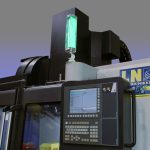Non-profit engineering research group adds electron beam system to toolbox
Non-profit engineering research group adds electron beam system to toolbox
EWI, a non-profit organization dedicated to innovating and implementing advanced manufacturing technologies for industry, soon will add an Electron Beam Additive Manufacturing (EBAM) system to its R&D toolbox. Chicago-based Sciaky Inc. announced the sale of its EBAM system in a news release issued July 20.
EWI, a Columbus, Ohio-based non-profit organization dedicated to innovating and implementing advanced manufacturing technologies for industry, soon will add an Electron Beam Additive Manufacturing (EBAM) system to its R&D toolbox. Chicago-based Sciaky Inc. announced the sale of its EBAM system in a news release issued July 20.
Sciaky, a provider of metal additive manufacturing solutions, will work with EWI to produce prototype parts for manufacturers in a variety of industries across the U.S. They plan to co-market their extensive metal 3D printing capabilities to the marketplace, according to the news release.
"Sciaky is very excited to work with an innovator like EWI," said Sciaky General Manager Mike Riesen. "Beyond simply selling an EBAM system to EWI, Sciaky will collaborate with EWI to advance and promote EBAM technology into mutual fields of interest. New applications and solutions will surely be discovered under this exciting partnership."
Known as the Edison Welding Institute until 2011, EWI offers applied research, manufacturing support, and strategic services to leaders in the aerospace, automotive, consumer electronic, medical, energy, government and defense, and heavy manufacturing sectors. The company strives to serve as an extension of the innovation and R&D teams of its manufacturer clients.
EWI leads the Advanced Manufacturing Institute, which is among the innovation institutes tasked with increasing public-private partnerships to support and further manufacturing in the U.S., according to a February 2014 announcement by President Obama.
Sciaky's EBAM system, meanwhile, is said to be "the most widely scalable, metal 3D printing solution in the industry (in terms of work envelope)." EBAM reportedly can produce parts ranging from 8" (203mm) to 19' (5.79m) in length. Yet, depending on the application, the EBAM system also is capable of making parts smaller and larger than that, according to Sciaky.
EBAM offers a fast deposition process in the metal additive manufacturing market, with gross deposition rates ranging from 7 to 20 lbs. (3.18 to 9.07 kg) of metal per hour. "Plus, with a dual wirefeed option, two different metal alloys can be combined into a single melt pool to create custom alloy parts or ingots," according to the Sciaky news release. "In addition, the mixture ratio of the two materials can be changed to create graded parts or structures."
To better understand how the EBAM system works, view the accompanying video produced by Sciaky.





